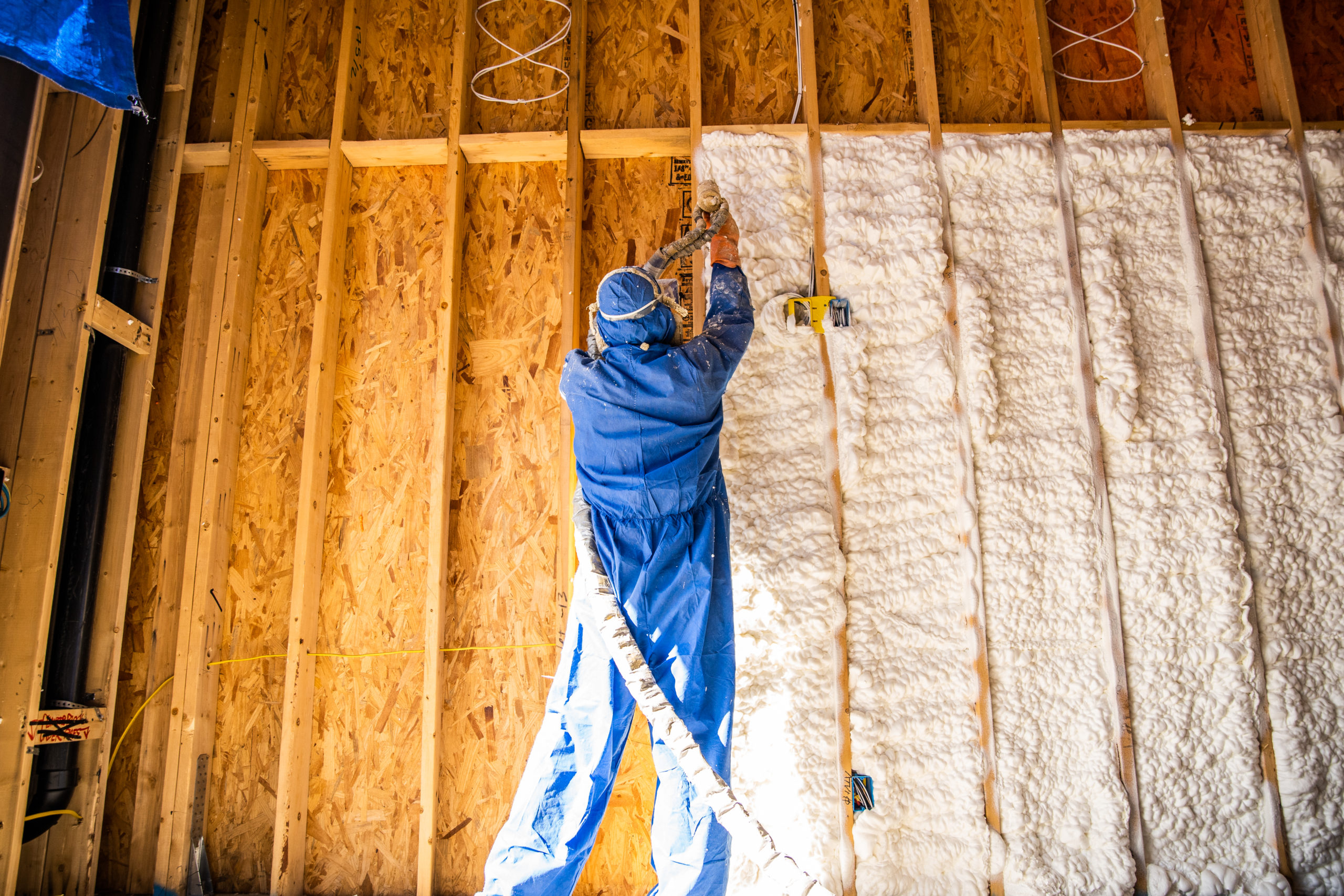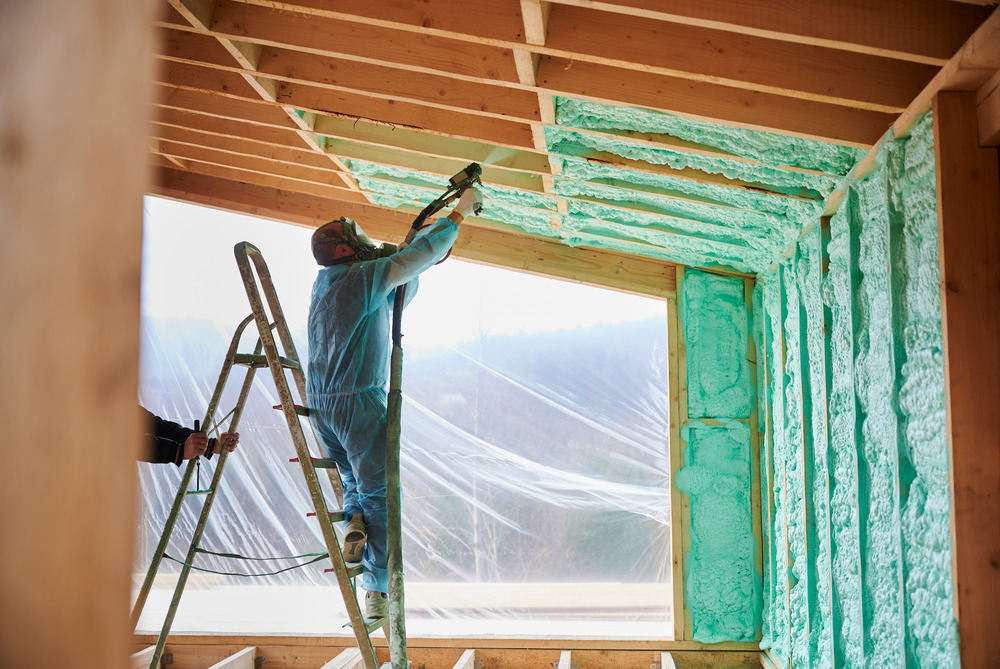Selecting the Right Type of Spray Foam for Your Insulation Requirements
Selecting the Right Type of Spray Foam for Your Insulation Requirements
Blog Article
Spray Foam: The Ultimate Solution for Air Sealing and Insulation
Spray foam insulation has actually emerged as a leading remedy for efficient air securing and thermal insulation, supplying an one-of-a-kind combination of residential or commercial properties that set it apart from standard techniques. Its capability to increase and load gaps makes it specifically reliable in avoiding air leak, which can considerably impact energy efficiency. Recognizing the complete scope of its advantages, installation processes, and comparisons with various other insulation kinds is vital for making educated choices. As we check out these aspects, the effects for both new buildings and retrofits end up being progressively considerable. What factors should influence your selection?
What Is Spray Foam?
Spray foam is a versatile insulation product that combines the concepts of air securing and thermal resistance to boost energy performance in buildings. Made up largely of polyurethane or other similar substances, spray foam is applied as a liquid that expands upon call with surface areas, creating a solid, constant layer of insulation. This unique residential or commercial property allows it to fill voids, fractures, and voids that traditional insulation products might forget, supplying an exceptional air seal.
There are two primary kinds of spray foam: open-cell and closed-cell. Open-cell spray foam is lighter and a lot more flexible, offering excellent audio absorption and a lower R-value per inch - Spray Foam. On the other hand, closed-cell spray foam is denser, offering a higher R-value, moisture resistance, and added architectural integrity to constructing elements
The application process normally includes specialized equipment, making sure a smooth application that sticks to numerous substratums, consisting of concrete, wood, and steel. This adaptability makes spray foam ideal for both brand-new buildings and retrofitting existing frameworks. Its capability to produce a closed barrier dramatically adds to minimizing power consumption and boosting indoor air top quality, therefore making it a preferred selection amongst building contractors and house owners alike.
Benefits of Spray Foam Insulation
One of the most considerable advantages of spray foam insulation is its remarkable capacity to produce a continuous air barrier, which efficiently lessens energy loss. Unlike typical insulation materials, spray foam expands to fill up fractures and gaps, making sure that air leakage is dramatically lowered. This characteristic not just enhances power efficiency but also leads to decrease utility bills with time.
Furthermore, spray foam insulation supplies premium thermal resistance, adding to a much more steady interior environment. Its high R-value per inch enables reliable insulation in constrained spaces, making it optimal for attic rooms, wall surfaces, and crawl spaces. The moisture-resistant buildings of spray foam help prevent mold and mold development, advertising much healthier living conditions.
Another crucial advantage of spray foam insulation is its sound-dampening top qualities (Spray Foam). It effectively lowers sound transmission between rooms, creating a quieter and much more comfy home environment. The resilience of spray foam likewise sticks out, as it does not droop or settle gradually, keeping its efficiency throughout its lifespan
Exactly How Spray Foam Works
Understanding just how spray foam insulation functions is important for valuing its performance in air securing and thermal resistance. Spray foam insulation includes two primary elements: isocyanate and polyol material. When these elements are blended, they undergo a chemical reaction that creates the material to expand rapidly, creating a dense foam that loads fractures, voids, and cavities.
As the foam expands, it abides by surfaces, developing a closed seal that look at this now considerably decreases air seepage. This characteristic makes spray foam insulation extremely efficient at protecting against drafts and dampness infiltration, which can bring about power loss and damages gradually. Additionally, the closed-cell variant of spray foam offers superior thermal resistance because of its stiff framework, properly decreasing warm transfer.
The distinct properties of spray foam enable it to satisfy irregular surface areas, guaranteeing comprehensive protection and a smooth barrier. Therefore, spray foam insulation not only boosts energy performance yet also adds to improved interior air quality by reducing the buildup of irritants and contaminants. Ultimately, comprehending the auto mechanics behind spray foam emphasizes its duty as a remarkable selection for insulation and air sealing in both read the article industrial and household applications.
Installation Refine Overview

Prior to installation, the room needs to be adequately cleaned and prepped, ensuring that surfaces are devoid of dust, debris, and wetness. This step is vital due to the fact that contaminants can jeopardize adhesion and general efficiency. As soon as the location is prepared, the application involves blending the two parts of the spray foam, which expands upon get in touch with and fills voids effectively.
Educated experts should conduct the setup, making use of customized tools to guarantee uniform insurance coverage and optimum thickness. Safety safety measures, consisting of putting on protective gear and guaranteeing proper ventilation, are necessary during this process. After application, the foam commonly remedies swiftly, creating a strong barrier that enhances energy performance.
Contrasting Spray Foam to Traditional Insulation
When assessing insulation options, spray foam insulation stands out in comparison to conventional products such as fiberglass and cellulose. Unlike fiberglass and cellulose, which can allow air seepage, spray foam expands upon application, filling up gaps and crevices to develop an airtight seal.
In addition, spray foam provides a greater R-value per inch than standard insulation kinds, using even more effective thermal resistance in a thinner account. This particular is particularly helpful precede over here with minimal cavity deepness. Additionally, spray foam is resistant to wetness and mold and mildew development, which can be a considerable interest in cellulose and fiberglass, specifically in moist settings.
Nevertheless, spray foam insulation generally lugs a higher upfront price than its typical counterparts. Home owners should evaluate this first financial investment against long-lasting energy financial savings and performance benefits. Eventually, while both insulation types offer their objective, spray foam becomes a much more advanced remedy for contemporary insulation requirements, especially in terms of air sealing and thermal effectiveness.

Conclusion
In summary, spray foam insulation represents a highly efficient service for attaining ideal air sealing and thermal resistance. Its unique residential properties, including wetness resistance and noise dampening, make it appropriate for different applications in both new constructions and retrofitting tasks (Spray Foam). Although the initial prices may be higher compared to traditional insulation materials, the long-lasting advantages, such as significant energy cost savings and improved indoor air quality, warrant the financial investment and underscore its worth in modern building techniques.
Spray foam insulation has actually arised as a leading remedy for efficient air securing and thermal insulation, offering a distinct mix of homes that set it apart from conventional methods.Spray foam is a flexible insulation product that incorporates the concepts of air sealing and thermal resistance to improve power performance in buildings.When assessing insulation choices, spray foam insulation stands out in comparison to traditional materials such as fiberglass and cellulose. Ultimately, while both insulation kinds offer their purpose, spray foam emerges as an extra innovative option for contemporary insulation requirements, especially in terms of air securing and thermal efficiency.
In recap, spray foam insulation represents a highly reliable solution for achieving ideal air sealing and thermal resistance.
Report this page